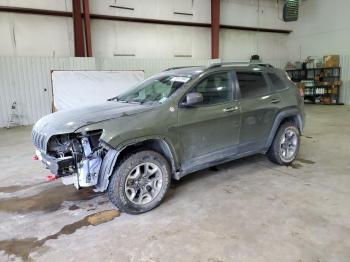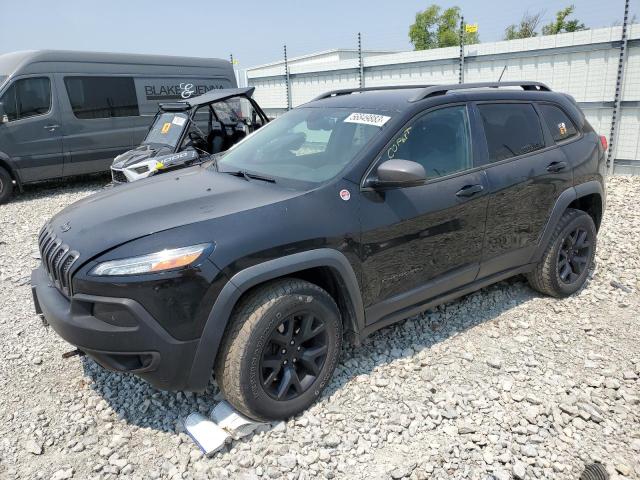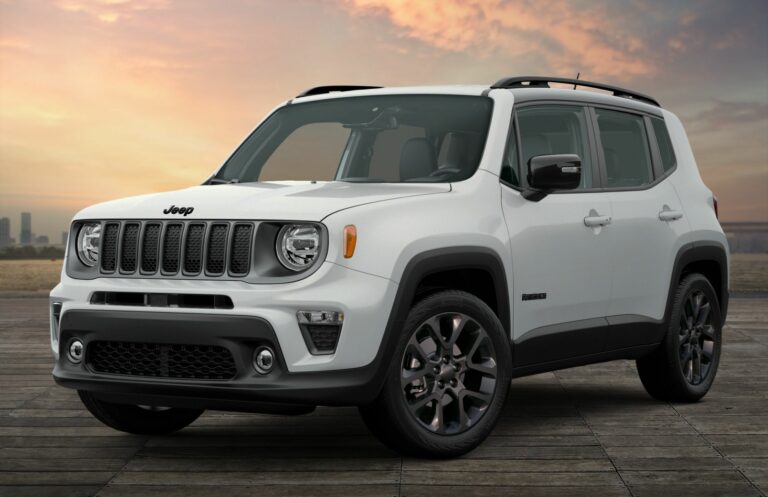Salvage Jeep Cherokee For Sale: Your Comprehensive Guide to Unlocking Value
Salvage Jeep Cherokee For Sale: Your Comprehensive Guide to Unlocking Value jeeps.truckstrend.com
The allure of a Jeep Cherokee is undeniable. Its rugged capability, iconic design, and versatile nature have made it a favorite for off-road enthusiasts, families, and daily commuters alike. However, the price tag on a new or even a well-maintained used model can be a significant barrier for many. This is where the world of "Salvage Jeep Cherokee For Sale" emerges as a fascinating, albeit complex, alternative.
A salvage title indicates a vehicle that an insurance company has declared a total loss, typically due to damage (from an accident, flood, fire, or theft) where the cost of repair exceeds a certain percentage of its pre-damage value. While this designation might initially sound alarming, it opens up a unique opportunity for the savvy buyer, the DIY enthusiast, or anyone looking for a budget-friendly entry into Jeep ownership. This comprehensive guide will navigate the intricacies of purchasing a salvage Jeep Cherokee, helping you understand the potential benefits, inherent risks, and crucial steps to make an informed decision.
Salvage Jeep Cherokee For Sale: Your Comprehensive Guide to Unlocking Value
Understanding the "Salvage Title"
Before diving into the specifics of a Jeep Cherokee, it’s vital to grasp what a salvage title truly signifies. When an insurance company "totals" a vehicle, it means they’ve determined that repairing the damage is not economically viable. This decision leads to the issuance of a salvage title, which permanently brands the vehicle as having sustained significant damage.
Common reasons for a salvage title include:
- Collision Damage: The most frequent cause, where impact has compromised the vehicle’s structure, body panels, or mechanical components beyond economical repair.
- Flood Damage: Water intrusion can wreak havoc on a vehicle’s electrical systems, interior, and mechanical parts, often leading to a total loss even if visible damage is minimal.
- Theft Recovery: If a stolen vehicle is recovered but damaged, stripped for parts, or gone for an extended period, an insurance company might declare it a total loss.
- Hail Damage: Severe hail can cause extensive body damage, which, while cosmetic, can be costly to repair and lead to a salvage title.
- Vandalism or Fire: Significant damage from these events can also render a vehicle a total loss.
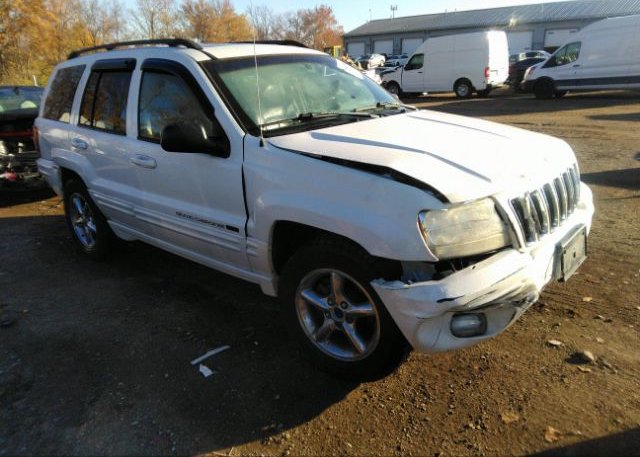
It’s crucial to distinguish between a "salvage" title and a "rebuilt" title. A vehicle with a salvage title cannot be legally driven on public roads until it has been properly repaired, inspected by the state, and issued a "rebuilt" title. A "rebuilt" title signifies that the vehicle has been repaired to a roadworthy condition and has passed the necessary state inspections.
Why Consider a Salvage Jeep Cherokee? (The Benefits)
Despite the inherent risks, a salvage Jeep Cherokee offers several compelling advantages for the right buyer:
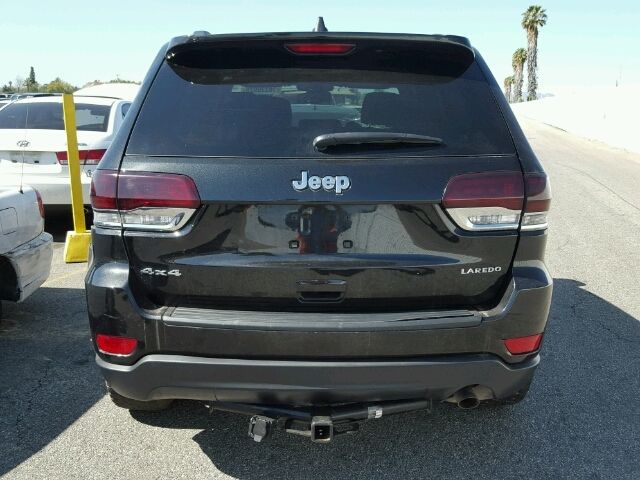
- Significantly Lower Purchase Price: This is arguably the biggest draw. Salvage vehicles are sold at a fraction of the cost of their clean-title counterparts, often 30-70% less, depending on the extent of the damage. This makes Jeep ownership accessible to a broader audience.
- Ideal for Parts Donors: For mechanics, body shops, or those restoring another Jeep Cherokee, a salvage vehicle can be an invaluable source of affordable, original equipment manufacturer (OEM) parts. Buying a whole salvage vehicle can be cheaper than purchasing individual components.
- Project Vehicle for Enthusiasts: Many Jeep Cherokee models, particularly the XJ (1984-2001) and newer KL (2014-present) generations, are popular platforms for off-roading, customization, and performance upgrades. A salvage title provides a blank canvas at a reduced initial investment, allowing enthusiasts to pour their budget into modifications rather than the purchase price.
- Potential for a "Rebuilt" Title and a Reliable Vehicle: If the damage is manageable and repairs are performed correctly, a salvage Jeep Cherokee can be transformed into a safe, reliable, and perfectly functional vehicle. The process of obtaining a rebuilt title adds a layer of scrutiny, ensuring the vehicle meets safety standards.
- Learning Experience: For those mechanically inclined, repairing a salvage vehicle offers a fantastic opportunity to learn about automotive systems, bodywork, and the entire repair process.

The Risks and Challenges of Salvage Jeep Cherokees
While the benefits are attractive, it’s imperative to approach a salvage purchase with eyes wide open to the potential pitfalls:
- Unknown Extent of Damage: The primary risk is that the full extent of the damage might not be immediately apparent. Hidden structural damage, electrical issues, or unseen water damage (especially with flood vehicles) can lead to unexpected and costly repairs.
- Difficulty Getting Insurance: Insuring a salvage title vehicle for full coverage (collision and comprehensive) can be challenging, if not impossible, until it receives a rebuilt title. Even then, some insurers may offer only liability coverage, or premiums might be higher.
- Challenges with Financing: Most lenders are unwilling to finance a vehicle with a salvage title due to the higher risk and uncertain value. This means salvage purchases are almost always cash-only transactions.
- Time and Cost of Repairs Can Exceed Expectations: What appears to be a minor repair can quickly escalate. Parts costs, specialized labor, and unforeseen complications can easily push the total investment beyond the vehicle’s market value, negating any initial savings.
- Lower Resale Value, Even with a Rebuilt Even after a successful rebuild and obtaining a rebuilt title, the vehicle’s market value will remain significantly lower than a comparable clean-title vehicle. The "rebuilt" brand is permanent and impacts future resale.
- Rigorous State Inspection Requirements: The process for obtaining a rebuilt title varies by state but typically involves a stringent inspection to ensure all repairs meet safety and structural integrity standards. Failing this inspection can lead to further delays and costs.
Where to Find Salvage Jeep Cherokees For Sale
If you’re ready to explore this niche market, here are the most common places to find salvage Jeep Cherokees:
- Online Auto Auctions:
- Copart and IAAI (Insurance Auto Auctions): These are the two largest public auto auction sites specializing in salvage, wrecked, and clear-title vehicles. They offer a vast inventory of Jeep Cherokees with detailed damage reports and photos. While some auctions are open to the public, others require a dealer license or a broker.
- Local Salvage Yards/Auto Recyclers: Many local salvage yards buy totaled vehicles directly from insurance companies. You might find a Jeep Cherokee that hasn’t made it to the major online auctions, potentially at a lower price.
- Specialized Used Car Dealerships: Some dealerships specialize in buying, repairing, and selling rebuilt title vehicles. While they will have already done the repair work and obtained the rebuilt title, their prices will be higher than buying a raw salvage vehicle, but the risk is also reduced.
- Online Marketplaces (with caution): Websites like Craigslist, Facebook Marketplace, and eBay Motors can list salvage vehicles directly from owners or small-scale flippers. Exercise extreme caution here, as transparency can be low, and scams are possible. Always insist on a physical inspection and full documentation.
Before You Buy: Essential Steps for Due Diligence
Purchasing a salvage Jeep Cherokee is not a decision to be taken lightly. Thorough due diligence is paramount to avoid a costly mistake.
- Thorough Inspection by a Qualified Mechanic: This is the most critical step. Never buy a salvage vehicle sight unseen. Even if you’re mechanically inclined, a professional inspection by a third-party mechanic specializing in frame and structural damage is non-negotiable. They can identify hidden damage, assess the integrity of critical components, and give you a realistic estimate of necessary repairs. Pay close attention to:
- Frame Damage: Bent or compromised frame rails are incredibly expensive and difficult to repair properly.
- Electrical System: Especially important for flood-damaged vehicles. Look for corrosion, mold, and non-functioning components.
- Suspension and Steering: Check for bent control arms, tie rods, or steering rack damage.
- Engine and Transmission: Look for leaks, signs of overheating, or unusual noises if the vehicle is runnable.
- Airbag Deployment: If airbags deployed, it signifies a significant impact and requires costly replacement of the airbag module, sensors, and the airbags themselves.
- Obtain a Vehicle History Report: Services like CARFAX or AutoCheck are invaluable. These reports can reveal:
- The original reason for the salvage title.
- Previous accidents or damage incidents.
- Service history and mileage discrepancies.
- Number of previous owners.
- Recall information.
- Estimate Repair Costs Realistically: Before bidding or making an offer, get multiple quotes for the necessary parts and labor. Add a significant buffer (20-30%) for unexpected issues. Research the cost of major components like engines, transmissions, body panels, and airbags. Remember, the goal is to save money, not spend more than a clean-title equivalent.
- Understand Your State’s Laws: Each state has specific requirements for titling and registering a salvage vehicle. Research the process for obtaining a "rebuilt" title in your state, including required inspections, documentation (receipts for parts, photos of repairs), and fees. This can be a lengthy and complex process.
- Consider Insurance Implications: Contact your insurance provider before purchasing to understand their policies on salvage or rebuilt title vehicles. Some companies may refuse to insure them for comprehensive coverage, or premiums may be higher.
The Rebuilt Title Process (Brief Overview)
Once you’ve purchased a salvage Jeep Cherokee, the journey to getting it on the road involves:
- Repair the Vehicle: Systematically repair all damage, ensuring the vehicle is safe and roadworthy. Use quality parts and follow manufacturer specifications. Document every step with photos and keep all receipts for parts and labor.
- State Inspection: Schedule and pass your state’s required salvage or rebuilt vehicle inspection. This is often a rigorous process, focusing on structural integrity, safety features (brakes, lights, seatbelts, airbags), and emissions. They will verify that stolen parts were not used.
- Documentation Submission: Submit all required paperwork, including the original salvage title, proof of ownership, repair receipts, photos, and inspection certificates, to your state’s Department of Motor Vehicles (DMV) or equivalent agency.
- Issuance of Rebuilt Upon successful completion of all steps, your state will issue a new title branded "Rebuilt," "Reconstructed," or similar.
Tips for a Successful Purchase and Rebuild
- Be Realistic About Your Skills and Budget: If you’re not an experienced mechanic or bodywork specialist, factor in the cost of professional labor. Don’t underestimate the time, effort, and money required.
- Prioritize Safety-Critical Repairs: Focus on brakes, steering, suspension, frame integrity, airbags, and lighting first. Cosmetic repairs can wait.
- Document Everything: Photos of the vehicle before, during, and after repairs, along with all receipts, are crucial for the rebuilt title process and for future resale.
- Network with Mechanics and Parts Suppliers: Building relationships with local auto parts stores and junkyards can save you money and time.
- Consider the Model Year: Older Jeep Cherokees (like the XJ) are often simpler mechanically, with abundant and affordable parts, making them ideal project vehicles. Newer models (like the KL) are more complex with advanced electronics, potentially increasing repair costs.
- Beware of Flood-Damaged Vehicles: While seemingly minor, flood damage can lead to persistent electrical issues, mold, and corrosion that are extremely difficult and costly to fully remediate.
Salvage Jeep Cherokee Price Guide (Representative Ranges)
Prices for salvage vehicles vary wildly based on the exact model year, trim, original value, extent of damage, and location. This table provides representative ranges and should be used for general guidance only.
| Condition/Damage Level | Estimated Salvage Purchase Price Range | Estimated Repair Cost Range (Parts & Labor) | Potential Rebuilt Value (vs. Clean Title) | Key Considerations |
|---|---|---|---|---|
| Minor Cosmetic Damage | $1,000 – $4,000 | $1,500 – $5,000 | 60-75% | Dents, scratches, minor panel damage. Airbags likely intact. Easiest repair. |
| Moderate Mechanical Damage | $800 – $3,500 | $3,000 – $8,000 | 50-70% | Engine/transmission issues, suspension damage, non-structural collision. |
| Major Structural/Collision | $500 – $2,500 | $5,000 – $15,000+ | 40-60% | Frame damage, multiple deployed airbags, severe front/rear end impact. High risk. |
| Flood Damage (Freshwater) | $300 – $2,000 | $4,000 – $12,000+ | 30-50% | Electrical nightmares, mold, corrosion. Extremely risky, avoid saltwater. |
| Parts Donor Vehicle | $200 – $1,000 | N/A (not for road use) | N/A | Major damage, seized engine, or just buying for specific parts. |
Note: "Potential Rebuilt Value" refers to the typical resale value of a rebuilt title vehicle compared to a similar clean-title vehicle. This percentage can fluctuate based on market demand, quality of repairs, and documentation.
Frequently Asked Questions (FAQ)
Q1: Can I drive a salvage title Jeep Cherokee immediately after purchase?
A1: No. A vehicle with a salvage title is not street legal. It must be repaired, inspected by the state, and issued a "rebuilt" title before it can be legally registered and driven on public roads.
Q2: Is it hard to get insurance on a rebuilt title Jeep Cherokee?
A2: It can be more challenging. Many insurers will offer liability coverage, but obtaining full comprehensive and collision coverage might be difficult or more expensive. Some insurers may refuse full coverage due to the vehicle’s history. Always check with your insurance provider before buying.
Q3: How much does it cost to get a rebuilt title?
A3: The cost varies by state. It typically includes inspection fees (which can range from $50 to several hundred dollars), administrative fees, and the cost of any required documentation (e.g., VIN verification). The major cost is, of course, the repairs themselves.
Q4: Are salvage cars safe after they are rebuilt?
A4: If a salvage vehicle is repaired correctly by qualified professionals using proper techniques and passes all state-mandated inspections for a rebuilt title, it should be as safe as a clean-title vehicle. The state inspection process is designed to ensure roadworthiness.
Q5: Will a rebuilt title affect the resale value of my Jeep Cherokee?
A5: Yes, significantly. Even a perfectly repaired and inspected vehicle with a rebuilt title will typically sell for 20-50% less than a comparable clean-title vehicle. The stigma of the salvage history permanently affects its market value.
Q6: What’s the best Jeep Cherokee model for a salvage project?
A6: Many enthusiasts prefer the XJ generation (1984-2001) for salvage projects due to its simpler mechanical design, robust aftermarket support, and abundant availability of affordable parts. Newer generations (like the KL) are more complex with advanced electronics, which can make repairs more costly and challenging.
Conclusion
The prospect of owning a Jeep Cherokee at a significantly reduced price is undoubtedly appealing, and exploring "Salvage Jeep Cherokee For Sale" can be a gateway to achieving that goal. For the mechanically inclined, the budget-conscious, or those seeking a unique project, a salvage Cherokee represents a compelling opportunity to unlock substantial value.
However, it’s a path fraught with potential challenges. Success hinges entirely on meticulous research, rigorous inspection, realistic budgeting, and a thorough understanding of the repair and titling process. A salvage title is not a death sentence for a vehicle, but rather a warning flag that demands careful consideration.
By approaching the purchase with caution, diligence, and a clear understanding of the risks and rewards, a salvage Jeep Cherokee can be transformed from a totaled wreck into a reliable, adventurous, and highly rewarding vehicle that serves you faithfully for years to come. It’s an adventure in itself, long before you even hit the trails.
